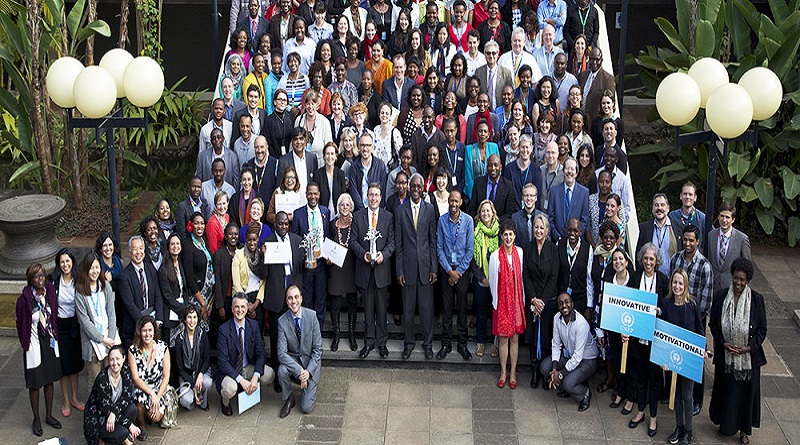After 10-year term, Achim Steiner bids UNEP farewell
After 10-year term that brought the United Nations Environment Programme (UNEP) to the fore as the voice for the environment in the UN system and the global authority on the environment, its Executive Director, Achim Steiner has bowed out of the organisation.
Steiner’s tenure was marked by numerous historic global environment success stories, not least the Paris Agreement on climate change in 2015. Several other international agreements on the environment preceded this, including the 2030 Agenda on Sustainable Development and the Rio+20 Conference on Sustainable Development, which saw UNEP upgraded to universal membership.
It was this upgrade of UNEP under Steiner that resulted in the United Nations Environment Assembly, a biennial meeting of the world’s environment ministers to chart the way forward on global environmental issues. The most recent meeting of UNEA resulted in a record 25 resolutions passed by member states, further establishing the Assembly as the de facto “World’s Parliament for the Environment.â€
A focus of Steiner’s career at UNEP was the confluence of the environment and the economy, a result of his background as a development economist. His decision in 2007 to launch a project called the Economics of Ecosystems and Biodiversity (TEEB), which was the first UN initiative to analyze the economic value of our environment, was an early move to bring together the orbits of the global economy and sustainability.
This underlying environmental foundation of the global economy was presented as a response to the financial collapse in 2007 and 2008 in the form of UNEP’s “Global Green New Dealâ€. This proposal underlined that economic stimulus packages could be directed towards investing in cleaner technologies and greener infrastructure.
In 2010, UNEP published its landmark “Green Economy†report, which highlighted both the centrality of environment to the future development of economies and the rapidly evolving policy innovations implemented by many countries.
Under Steiner’s leadership, UNEP’s relationship with the financial sector was also further expanded. To date, the UNEP Finance Initiative, which looks at how to fund sustainable development, has partnered with over 200 banks and financial institutions. And in 2014, the launch of the UNEP Inquiry into the Design of a Sustainable Financial System showed that there is a historic opportunity to reshape the financial system to support the transition to an inclusive green economy. UNEP’s economics work was recognized when it was asked in 2015 to provide the secretariat to the G20 Green Finance Study Group.
Steiner also made progress in areas such as chemicals and waste. The Minamata Convention, a global treaty to protect human health and the environment from the adverse effects of mercury, was conceived under his guidance and is set to soon go into force.
Steiner worked tirelessly to protect ecosystems at large. Efforts to protect the world’s oceans included studies and projects designed to combat marine litter. The UN REDD programme, a partnership between UNEP, FAO and UNDP, was launched during Steiner’s tenure in 2008 to combat deforestation, forest degradation and climate change.
And in Nigeria’s Ogoniland, where decades of oil extraction has resulted in widespread devastation to local mangroves and wetlands, and dramatic health effects in the local population, UNEP worked under Steiner to conduct a survey of the impacts of oil spills and pollution, and propose the mechanisms for a cleanup. Only a few weeks ago this decades-in-the-making cleanup and restoration effort was launched with an initial funding commitment of $1 billion, promising long-awaited relief for the people of the Niger Delta.
At the final meeting of UNEP’s Committee of Permanent Representatives (CPR), multiple countries and regional groups paid tribute to Steiner’s leadership at UNEP over the past decade. The European Union recognized his leadership in nurturing UNEP into a mature global institution, and the Group of 77 and China recognized his important guidance in charting the path for UNEP to become the leading global authority for the environment, which sets the global environment agenda.
India highlighted UNEP’s special relationship with the county and congratulated his hard work in leading UNEP’s evolution, and the United States put on record an appreciation of Steiner’s leadership over the past decade.
These sentiments were supported by UNEP’s host country Kenya, AMCEN chair Egypt, Germany, Brazil, Canada, and Switzerland, among many who took the floor.
Afterwards, speaking on behalf of the African group of states, Ambassador Kelebert Nkomani, summed up the sentiment in the CPR, saying, “Today the environmental agenda is well-integrated in the international agenda. This is largely attributable to [Achim Steiner]… Your passion for your work is second to none. We have no doubt you will make an impact wherever you go.â€
Steiner departs UNEP to lead the Oxford Martin School, a multidisciplinary research school at the University of Oxford in the United Kingdom. He is succeeded at UNEP by Erik Solheim, a former Norwegian politician and diplomat, who has served as the OECD-DAC chair and will assume his post on 28 June, 2016.




